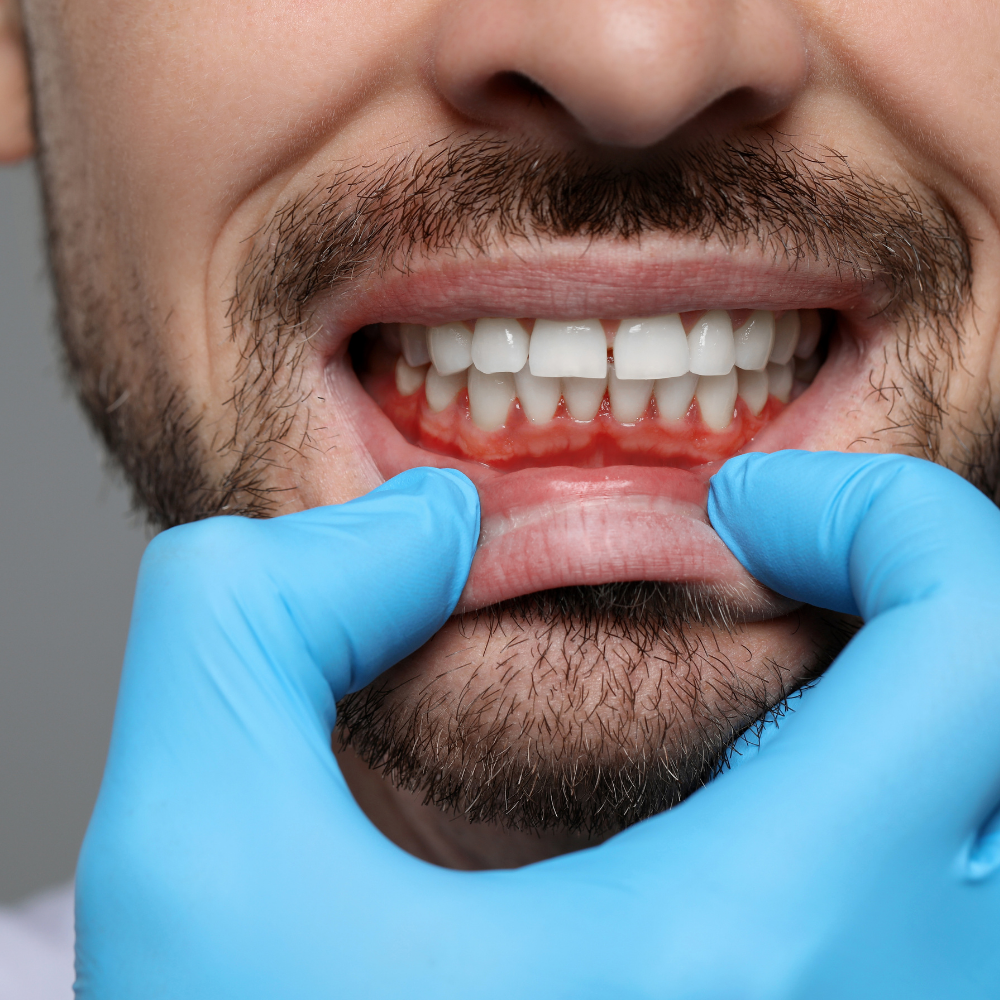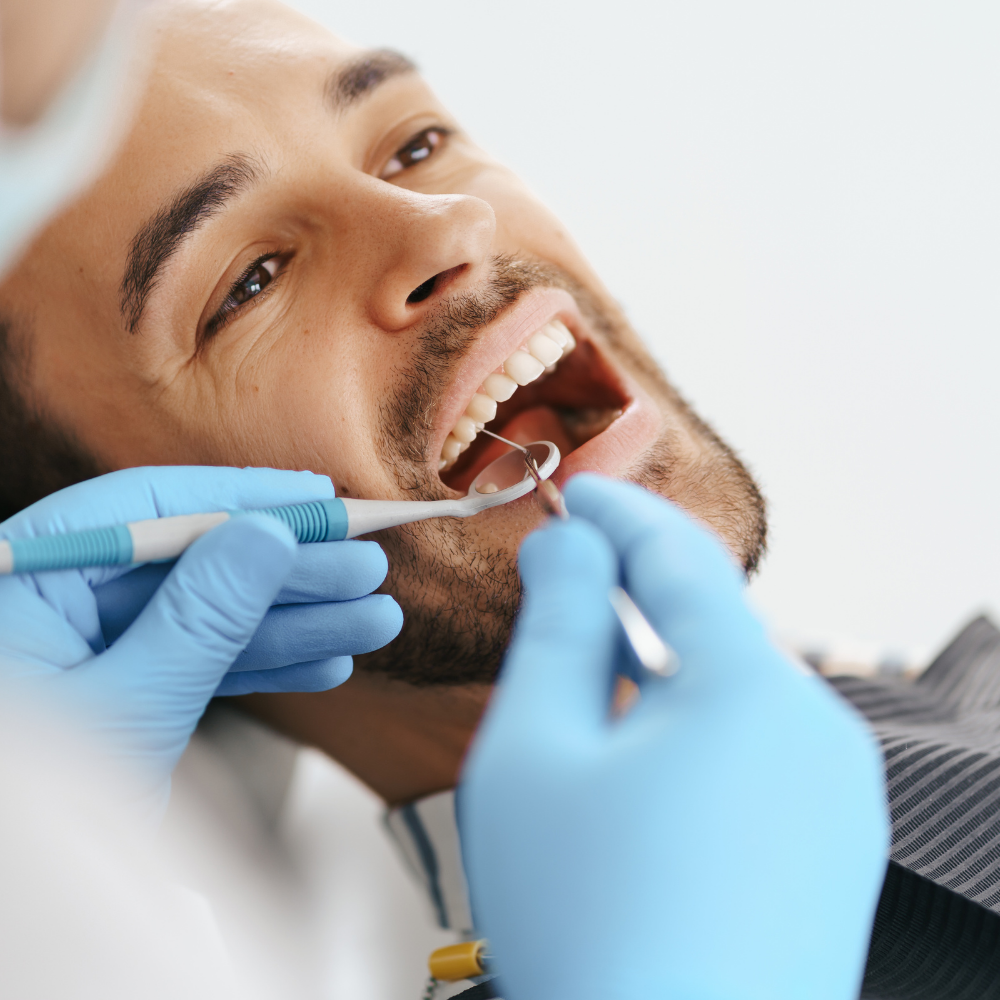
If you’ve ever noticed pink or red in the sink after brushing your teeth, you’re not alone. Bleeding gums are one of the most common dental concerns patients bring to our Sugar Land practice, and while it might seem like a minor issue, it’s actually your mouth’s way of sending you an important message.
As general dentists serving Sugar Land and the surrounding communities, we’ve helped countless patients understand what bleeding gums really mean and how to address this warning sign before it becomes a more serious problem. Let’s explore the causes, implications, and solutions for bleeding gums so you can take control of your oral health.
What Causes Gums to Bleed?
Gingivitis: The Most Common Culprit
The primary reason your gums bleed during brushing is gingivitis, the earliest stage of gum disease. When plaque — a sticky film of bacteria — accumulates along your gumline, it irritates the delicate gum tissue, causing inflammation, redness, and bleeding.
Think of it this way: if you had a cut on your hand that was constantly being irritated, it would remain inflamed and tender. Your gums react similarly when bacteria continuously irritate them. The good news is that gingivitis is completely reversible with proper care and professional treatment.
Poor Oral Hygiene Habits
Many patients are surprised to learn that their bleeding gums might actually be a result of not brushing and flossing enough, rather than brushing too hard. When you skip regular oral hygiene, plaque builds up and hardens into tartar, which can only be removed by professional dental cleaning.
Inconsistent flossing is particularly problematic. If you only floss occasionally, your gums aren’t accustomed to the stimulation, making them more likely to bleed. Regular daily flossing actually strengthens your gums and reduces bleeding over time.
Beyond Gingivitis: Other Potential Causes
Aggressive Brushing Technique
While inadequate brushing is more common, some patients do brush too aggressively or use a toothbrush with bristles that are too firm. This mechanical trauma can cause healthy gums to bleed. Using a soft-bristled toothbrush and gentle, circular motions is always the best approach.
Hormonal Changes
Pregnancy, menstruation, and menopause can all affect your gums’ sensitivity. Hormonal fluctuations increase blood flow to the gums and can make them more reactive to plaque, leading to a condition called “pregnancy gingivitis.” If you’re experiencing hormonal changes, it’s especially important to maintain excellent oral hygiene.
Medical Conditions and Medications
Certain health conditions can contribute to bleeding gums. Diabetes, for instance, affects your body’s ability to fight infection, making gum disease more likely and severe. Blood-thinning medications like warfarin or aspirin can also make your gums more prone to bleeding.
Vitamin deficiencies, particularly vitamin C and vitamin K, can affect your gums’ health and their ability to heal properly. A balanced diet rich in nutrients supports not just your overall health but your oral health as well.
The Warning Signs You Shouldn’t Ignore
Bleeding gums rarely occur in isolation. Pay attention to these accompanying symptoms that might indicate progressing gum disease:
- Red, swollen, or tender gums that feel different from their normal pink, firm texture signal inflammation that needs attention.
- Persistent bad breath or bad taste often accompanies gum disease because bacteria produce sulfur compounds that create unpleasant odors.
- Gums that appear to be pulling away from your teeth indicate that the infection may be progressing beyond gingivitis into more serious periodontitis.
- Changes in how your teeth fit together when you bite down can signal that the supporting structures of your teeth are being affected.
Why You Shouldn’t Wait to Address Bleeding Gums
The Progression from Gingivitis to Periodontitis
When gingivitis goes untreated, it can advance to periodontitis, a more serious form of gum disease that affects the tissues and bones supporting your teeth. Unlike gingivitis, periodontitis causes irreversible damage and is the leading cause of tooth loss in adults.
In our Sugar Land practice, we use advanced 3D scanning technology to detect early signs of gum disease that might not be visible during a regular examination. This allows us to intervene early and prevent progression to more serious stages.
The Connection to Overall Health
Research continues to reveal strong connections between gum disease and systemic health conditions. The bacteria from infected gums can enter your bloodstream and contribute to heart disease, stroke, diabetes complications, and other serious health issues.
Taking care of your gums isn’t just about preserving your smile — it’s an investment in your overall health and well-being.
Effective Solutions for Bleeding Gums

Professional Treatment Options
The first step in addressing bleeding gums is a thorough professional evaluation. During your visit to our Sugar Land office, we’ll assess the extent of any gum disease using digital x-rays and visual examination to create a personalized treatment plan.
Professional dental cleanings remove the plaque and tartar that at-home care can’t eliminate. For patients with more advanced gum disease, we may recommend scaling and root planing, a deep cleaning procedure that removes bacteria from below the gumline and smooths root surfaces to promote healing.
Improving Your Home Care Routine
The foundation of healthy gums is consistent, proper home care. Use a soft-bristled toothbrush and fluoride toothpaste, brushing for two full minutes twice daily. The technique matters—use gentle circular motions rather than aggressive back-and-forth scrubbing.
Daily flossing is non-negotiable for gum health. If traditional floss is difficult for you to use, consider water flossers or floss picks as alternatives. The key is finding a method you’ll use consistently every day.
An antimicrobial mouthwash can provide additional protection against the bacteria that cause gum disease, but it should supplement, not replace, brushing and flossing.
When to Seek Professional Help
While minor, occasional bleeding might resolve with improved oral hygiene, persistent bleeding gums warrant professional evaluation. Contact our Sugar Land practice if you experience bleeding that continues for more than a week despite good oral care, or if bleeding is accompanied by pain, swelling, or other concerning symptoms.
Early intervention is always more comfortable and cost-effective than treating advanced gum disease. Our team uses the latest technology, including digital x-rays and CEREC same-day crowns when restoration is needed, to provide efficient, comfortable treatment.
Prevention: Your Best Defense
Preventing bleeding gums is much easier than treating advanced gum disease. Regular professional cleanings every six months, combined with excellent daily oral hygiene, keep most patients’ gums healthy and bleeding-free.
For our patients without dental insurance, we offer an in-house Wellness Plan that makes preventive care affordable and accessible. This plan ensures you can maintain regular professional cleanings and examinations without financial barriers.
Take Action for Your Gum Health Today
Ready to take control of your gum health? Call our Sugar Land office today at (281)-930-5752 to schedule your comprehensive evaluation and take the first step toward healthier gums and a healthier smile.
